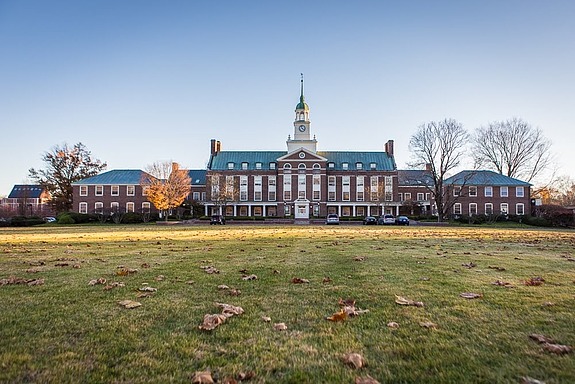IAS Welcomes 241 New and Returning Scholars for 2020–21 Academic Year
Press Contact

Virtual “Welcome Day,” held on September 21, 2020, marked the formal start of the Institute for Advanced Study (IAS) 2020–21 academic year. This year, 241 leading scholars and scientists, representing over 100 academic institutions in over 20 countries, will work alongside the Institute’s 25 permanent Faculty. This year’s class is comprised of scholars both in-residence and working remotely through a virtual interface that will enable enhanced communication and collaboration.
During a digital presentation reflecting on the Institute’s long history, Robbert Dijkgraaf, IAS Director and Leon Levy Professor remarked, “in addition to the groundbreaking research that takes place on campus, the Institute’s footprint will be enlarged this year through a number of interactive digital channels that will reinforce and leverage the creativity of our global community of scholars.”
Research at IAS is conducted across four Schools—Historical Studies, Mathematics, Natural Sciences, and Social Science—to push the boundaries of human knowledge through interdisciplinary collaboration and intellectual risk-taking. This research in turn has the goal of developing new insights to benefit society, technology, and scholarship.
The expansion of virtual outreach enables collaboration and access to Institute scholarship in novel and exciting ways. A range of academic seminars and public events will now be available to audiences around the world in real-time.
IAS scholars collectively pursue an extraordinary breadth of study enhanced by dialogues between schools. The following four scholars represent a unique cross-section of this year’s class:
Theoretical physicist Natalie Paquette is an incoming Member in the School of Natural Sciences and a former Sherman Fairchild Postdoctoral Fellow at Caltech’s Walter Burke Institute of Theoretical Physics. She is interested in understanding the mathematical structures that underlie fundamental physics, particularly string theory, describing the interplay between these two subjects as “quite beautiful and rewarding.”
Diana Graizbord is an ethnographer and Assistant Professor of Sociology and Latin American and Caribbean Studies at the University of Georgia. As a Member in the School of Social Science, she plans to further investigate the relationship between expertise and democracy. Her work considers specifically, how policy expertise shapes political accountability processes in contemporary Mexico. Her work aligns closely with the theme of the School of Social Science this year, “Science and the State.”
The School of Mathematics special year, Geometric and Modular Representation Theory, will bring together elite researchers to explore the many facets of a field that has underpinned various developments in modern mathematics. Allen Yuan, an incoming Visitor in the School and a recent graduate from MIT, studies problems in homotopy theory and algebraic topology. In addition to the learning opportunities provided by the special year, Allen finds “interactions between different fields of math” to be especially valuable.
Carissa M. Harris, incoming Member in the School of Historical Studies and Associate Professor at Temple University studies gender and sexuality in the Middle Ages. Among the questions she seeks to answer are: “Where did the roots of our current sexual culture and our expectations for gendered behavior come from?” and “How did carryovers from the Middle Ages shape ideas about race and gender in America that we’re still grappling with today?”
IAS scholars are selected by the permanent Faculty in a highly competitive process for their bold ideas, innovative methods, and deep research questions. Despite a year of many unknowns, it is precisely these types of uncertainties that motivate scholars to study, explore, and contribute to achieving a more prosperous and informed society.
Learn more about our scholars and their research here.
About the Institute
The Institute for Advanced Study is one of the world's foremost centers for theoretical research and intellectual inquiry. Located in Princeton, N.J., IAS is dedicated to independent study across the sciences and humanities. Founded in 1930 with the motto "Truth and Beauty," the Institute is devoted to advancing the frontiers of knowledge without concern for immediate application. From founding IAS Professor Albert Einstein to the foremost thinkers of today, IAS enables bold, nonconformist, field-leading research that provides long-term utility and new technologies, leading to innovation and enrichment of society in unexpected ways.
Each year, the Institute welcomes more than 200 of the world’s most promising researchers and scholars who are selected and mentored by 25 permanent Faculty. Comprised of four Schools—Historical Studies, Mathematics, Natural Sciences, and Social Science—IAS has produced an astounding record of introducing new understanding and is responsible for undeniable progress across disciplines and generations, from the development of one of the first stored-program computers to the establishment of art history as a discipline in the United States. Among its present and past Faculty and Members are 34 Nobel Laureates, 42 of the 60 Fields Medalists, and 19 of the 22 Abel Prize Laureates, as well as many MacArthur Fellows and Wolf Prize winners.